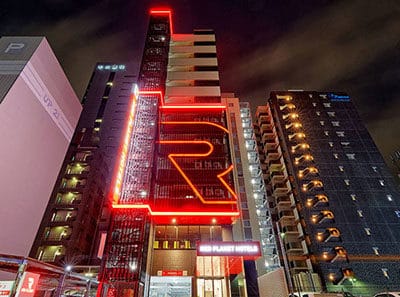
GreenOak founder Sonny Kalsi looks happy with the results of his company’s JV with Red Planet
AXA IM – Real Assets has agreed to acquire a hotel in Hiroshima for JPY 4.6 billion ($43 million), according to an announcement from the property arm of the French insurer on 22 July.
The Paris-based fund manager is purchasing the unfinished Red Planet Hiroshima Nagarekawa from a joint venture between a Japanese unit of Sonny Kalsi’s GreenOak Investment Management and the local branch of Bangkok-based budget hotel chain Red Planet.
The acquisition of the 160 room project is the third Japanese addition to AXA IM – Real Assets’ €2.5 billion ($2.8 billion) hotel portfolio, which includes assets in 11 countries.
Red Planets in Motion
“This acquisition is in line with our strategy to increase our exposure in the hotels sector in the region, and especially in the city of Hiroshima, which is consistently ranked as a top tourist destination in Japan for its world-renowned cultural landmarks, scenery, and cuisine,” said Laurent Jacquemin, head of Asia Pacific at AXA IM – Real Assets.
The disposal by Red Planet, which has been called the fastest-growing budget hotel operator in Asia, and GreenOak comes eighteen months after the pair of companies entered into a JPY 22.2 billion joint venture to finance up to six new hotels by the end of 2019.

Red Planet’s Nagoya Nishiki hotel in the capital of Japan’s Aichi Prefecture
Real estate investment firm GreenOak, founded by Kalsi in 2010 after the former head of real estate for Morgan Stanley left the investment bank, merged with Canadian property investment manager Bentall Kennedy late last year to form Bentall GreenOak.
The deal for the Hiroshima hostelry is also the second sale of a Japanese Red Planet in less than two months, after Hong Kong’s Wing Tai Holdings in June acquired a 134-room Tokyo hotel managed by the Thai chain from GK Rio Grande for JPY 4.25 billion.
New Supply Driven by 2020 Olympics
The Red Planet Hiroshima Nagarekawa is due for completion in the second quarter of 2020, and is located a ten minute walk from the Hondori shopping arcade and a 20 minutes stroll from the Hiroshima Peace Memorial in the city’s Naka ward.
The Ebisu-Cho and Fukuro-machi tram stations are within walking distance of the hotel, while the Itsukushima Shrine is an hour away by train and ferry.
According to Savills, a surge in upcoming supply of limited-service, or budget, hotels throughout Japan in anticipation of the 2020 Olympics may crowd the market over the next two years, with Tokyo estimated to increase its stock of the economy-oriented inns by 24.9 percent for between 2018 and 2020.
As a possible sign of cooling investor sentiment towards the sector, UBS in late 2018 backtracked on a plan to invest $400 million in hotels in Tokyo and other key Japanese cities, announcing instead that it would allocate $330 million to multi-family residential assets.
Leave a Reply